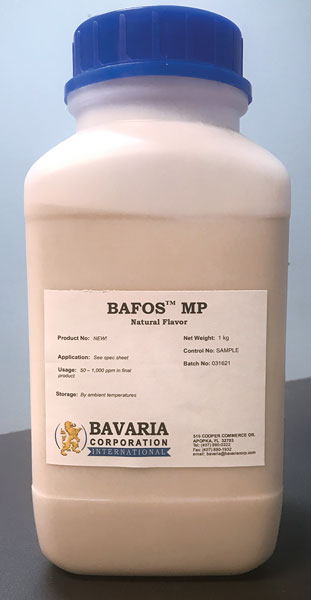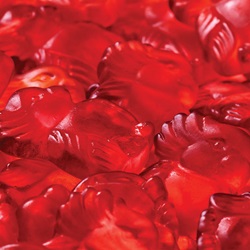
Innovation Award Winners Embrace Back to Nature
The three winning food ingredients enhance food safety, product visual appeal, and sustainability.
Article Content
As consumers seek more ‘natural’ products with fewer additives and ‘simpler’ ingredients, more knowledge of what’s in their food, and how their food is made, this clean label movement is spurring innovations in product development in the food industry. Three such innovations—a flavor with natural antimicrobial properties, plant-based red colorings, and sweeteners made from upcycled food waste—won the top honors in the IFT19 Food Expo Innovation Awards competition, which culminated with the first public announcement and presentation of the awards to Bavaria Corp., Chr. Hansen, and Comet Bio at the IFT19 annual event in New Orleans.
 Flavor Exhibits Antimicrobial Action
Flavor Exhibits Antimicrobial Action
Bavaria Corp. garnered the 2019 IFT Food Expo Innovation Award for its Bafos MP Natural Flavor, which contains natural preserving agents that have strong antimicrobial properties against yeast, mold, and gram-positive bacteria. The antimicrobial action is based on interaction with and disintegration of microbial membranes. Derived from a food-grade aqueous extract of an edible fungus, the water-soluble ingredient offers an alternative to sorbate and benzoate and is well-suited for preserving low pH foods and beverages.
The ingredient has good stability in acidic and neutral conditions, allowing for long-lasting activity. In tests using 100 ppm of the natural flavor in orange juice, 5 ppm in iced tea, and 15 ppm in a carbonated lemon-lime drink, the beverages showed no microbial growth after three months. In a test using 10 ppm of the flavor in 12% juice fruit drink, the sample showed no microbial growth after four weeks.
“There is a huge need in the marketplace for clean alternatives to sodium benzoate and potassium sorbate to retard spoilage, especially for mold and yeast in products less than pH 4.0,” noted a juror. Another juror stated, “Antimicrobial resistance is a growing issue with the overuse of antibiotics. Discovery of natural products compatible with food systems is a real innovation.”
 Red Colorings From Sweet Potato
Red Colorings From Sweet Potato
Chr. Hansen was honored for its Minimally Processed FruitMax Reds from its Hansen Sweet Potato. The vibrant red colorings provide a plant-based alternative to carmine and synthetic reds. Available as a water-soluble powder or liquid, the red colorings are heat and light stable with no off-tastes and are less pH sensitive than other fruit and vegetable concentrates. In the United States, the red colorings can be labeled as “vegetable juice (color)”, “colored with vegetable juice” or “color added”. Applications include confectionery, fruit preparations, bakery, and fermented dairy products.
More than 10 years ago, Chr. Hansen discovered a promising pigment in a root vegetable’s tuber, but the plant’s pigment content was on the low side. Its team of agronomists took this plant and embarked on a process of selective breeding using traditional, non-GMO methods. The company partnered with growers to learn the best ways to plant, nurture, and harvest the Hansen sweet potato. Harvested year-round, sweet potatoes are an adaptable, renewable source that take 7–8 months to grow.
“For natural products, a stable red color not derived from animals or synthetics is an advancement and innovation,” declared a juror. Another juror added, “Products made with these colors will improve the visual quality of products and eating experience for consumers.”
Sweeteners From Upcycling
Comet Bio captured the 2019 IFT Food Expo Innovation Award for its Sweeterra Syrup Blends, which have up to 35% less calories, lower sugar, and higher dietary fiber content than traditional corn syrup. This value proposition is particularly attractive to nutrition bar companies who are trying to lower sugar content and add functional health properties to their products without compromising taste. In cereal bars, substituting the syrup blends for corn syrup doubles the fiber content.
Made from upcycled food and farm leftovers such as wheat straw and corn stalks, the sweetener blends are functionally equivalent to corn syrup and can be used in confectionery, gummies, fruit preparations, energy drinks, nutrition bars, and bakery products. By using farm and food leftovers, the ingredients create a circular food system and help turn waste into an economic opportunity for farmers and food and beverage producers. According to an independent well-to-wheel Lifecycle Carbon Emissions Assessment (LCEA), the syrups reduce greenhouse gases by up to 60% compared to traditional corn syrup.
The syrup blends are a “perfect example of sustainable/byproduct/waste utilization effort, which many agencies such as UN-FAO, USDA, and FDA have been advocating,” remarked a juror. Another juror stated, “Innovative thinking topped with sustainability. There should be plenty of market demand by companies looking to ensure farm to product sustainability.”
“We’d like to thank the Institute of Food Technologists for recognizing the innovation behind our Sweeterra syrups,” said Comet Bio CEO Rich Troyer. “Our customers are eager for ingredients that align with consumer trends around health and sustainability without sacrificing product taste or performance. This award validates the hard work and progress we’re making to build the future of ingredients without compromise.”
The 2019 IFT Food Expo Innovation Awards were presented to the three companies at the awards ceremony by IFT President-Elect Designate Noel Anderson. “Now in its 13th year, the Food Expo Innovation Awards program is a showcase for amazing advancements in our profession,” said Anderson. “Exclusive to companies exhibiting at the IFT19 Food Expo here in New Orleans, these awards honor outstanding innovation in products, ingredients, technologies, instrumentation, equipment, and services that were commercially introduced since January 1st of 2018.”
A panel of 10 jurors—chaired by Lorraine Tam—from academia, government, and industry with broad expertise in research & product development, processing & packaging technology, and food safety selected the three companies and their innovations from 30 qualified entries. Judging criteria included degree of innovation, technical advancement, benefits to food manufacturers and consumers, and scientific merit.
IFT Podcasts

Episode 33: Global Food System Challenge Growth Grant Winners
Join us to celebrate the Global Food System Challenge Growth Grant Winners. Representatives from Food Systems for the Future (FSF Institute), iDE Global, and the African Center for Technology Studies discuss their work and the role that the generous funding from Seeding The Future Foundation plays in helping to make healthier diets more accessible and empowers consumers to make choices benefitting both personal and planetary health.

Episode 32: Global Food System Challenge Grand Prize Winners
Join us to celebrate the Global Food System Challenge Grand Prize Winners. Representatives from the International Rice Research Institute, Solar Freeze, and WorldFish discuss their work and the role that the generous funding from Seeding The Future Foundation plays in helping to make healthier diets more accessible and empowers consumers to make choices benefitting both personal and planetary health.







